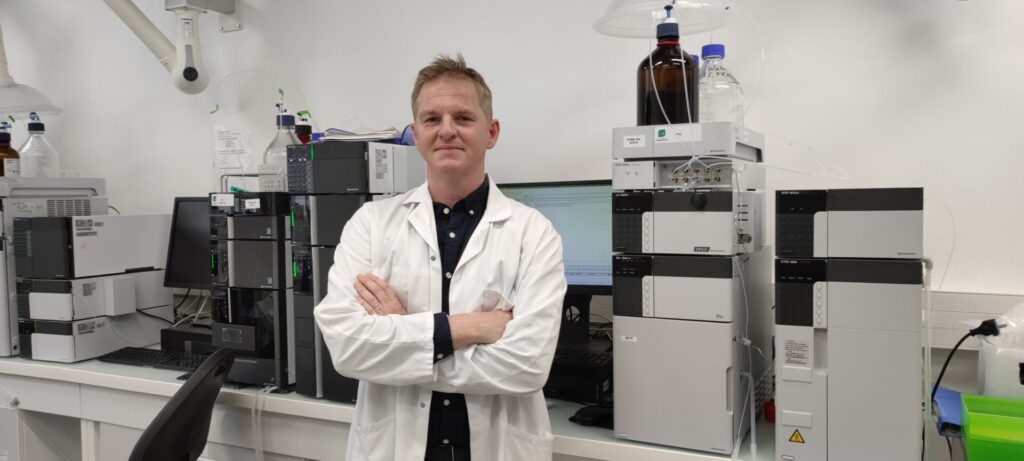Infertility, fibroids, and endometriosis: Womed, a startup dedicated to women's health
Based at the Center for Innovation and Transfer (CIT) and in partnership with the Max Mousseron Biomolecules Institute (IBMM), the start-up Womed is continuing to develop and market its first product, the Womed Leaf medical device, which aims to prevent the formation of intrauterine adhesions. Already the winner of numerous awards, the company is currently working on new technologies capable of treating fibroids, endometriosis, and uterine bleeding.

This is the story of a small company that is growing, growing, growing... In the premises of the Innovation and Transfer Center of the Balard chemistry cluster (research building), Womed is reaching an important milestone. Founded in 2018 under the auspices of the University of Montpellier, the CNRS, the Montpellier School of Chemistry, SATT AxLR, and the Nîmes University Hospital, this start-up has just raised €6 million to develop and market Womed Leaf. This innovative medical device uses a polymer film as a uterine dressing to prevent the formation of synechiae (or adhesions) and the infertility problems they can cause. Based on polymer technology developed in partnership with the IBMM's Polymers for Health and Biomaterials department, this device could soon evolve into a prolonged-release drug delivery system for the long-term treatment of various uterine conditions.
Adhesions that reform in nearly half of cases
After several years of promising studies and tests, Womed Leaf went into production in early 2024. It is the result of a three-way discovery. Stéphanie Huberlant (Nîmes University Hospital), Salomé Leprince (Womed R&D manager), and Xavier Garric (Nîmes University Hospital/Medical Unit) have been working on this polymer since 2013. At the time, their goal was to reduce the risk of synechiae, uterine adhesions that affect nearly 500,000 women worldwide each year. "A synechia is a kind of spider's web that forms in the uterus, usually after surgery, and disrupts the normal functioning of the uterus," explains Xavier Garric. In short, they increase the risk of infertility, miscarriage, and even intrauterine pregnancy, but they can also complicate menstrual flow. And despite the possibility of reducing them through surgery, these adhesions reform in nearly half of all cases. In short, they are a real scourge that the medical world has been unable to eradicate until now.
Patented in 2016, the ultra-innovative device developed by the founders of Womed was created in collaboration with the gynecology department at Nîmes University Hospital. Consisting of a polymer film that molds to the uterine wall, Womed Leaf unfolds almost instantly upon contact with the mucous membranes. "Adhesions form in the first week after surgery. Until now, we used a hyaluronic acid gel, but its effect was much too short-lived before it dissolved. Womed Leaf remains in place for at least a week to act as a mechanical anti-adhesion barrier before being naturally expelled," explains the researcher.
Significant clinical improvement
Founded in February 2018 by Gonzague Issenmann, Xavier Garric, and Stéphanie Huberlant, the start-up quickly conquered the scientific and medical ecosystem. That same year, the team won the I-Lab Grand Prize, with a prize of several hundred thousand euros. This was a significant boost that enabled it to hire its first three employees and carry out all the necessary tests. In 2021, shortly after obtaining CE marking (European certification), Womed launched an international randomized "multicenter" study on 154 patients, designed to demonstrate its effectiveness in several gynecology departments treating the most severe cases of synechia worldwide.
On this occasion, the device was used in the Netherlands, Belgium, the Czech Republic, Italy, Spain, China, and elsewhere . The results, obtained in January 2024, proved to be "excellent. " "We showed that women were 2.4 times more likely to have no adhesions when the medical device was used after treatment. Womed Leaf is therefore the first intrauterine barrier to show a clinically significant improvement in this complex indication," summarizes Xavier Garric. Already in use at the university hospitals of Nîmes and Montpellier, this device could soon conquer the various gynecology departments in France and Europe, before targeting the US in 2025.
Fibroids, bleeding, endometriosis
But Gonzague Issenmann, Xavier Garric, and all Womed employees are already thinking about the next step. "We've gone back to research and development to create an intrauterine delivery system," explains the researcher. This time, the goal goes far beyond a simple "mechanical" bandage. The device could transport and release molecules over a prolonged period. The idea? To facilitate the treatment of fibroids in the short term, followed by uterine bleeding and endometriosis.
“Some oral medications have significant side effects and are not sufficiently effective systemically. This system could enable us to resolve these kinds of problems. The goal here is to enable our device to last several months, releasing effective concentrations of drugs while adapting to patients' needs," adds Xavier Garric. Hence the importance of this fundraising effort, which will enable the team to continue exploring this amazing material. "In biotech, the sums involved are much higher," confirms the co-founder of this company, which was recently awarded the highly selectiveEuropean Innovation Council prize last March. This was an opportunity to prove, if proof were still needed, how spot on this technological feat was.